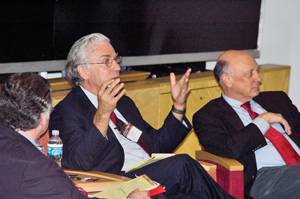EPLI starts, kicks off its thematic year

David Morris, Vice President of the Institute for Local Self-Reliance, responds to a question at the roundtable discussion on Energy, Security, and Sustainability, Thurs., Sept. 25, 2008, at the Alliant Energy Auditorium in Howe Hall. The discussion featured R. James Woolsey, Venture Partner with VantagePoint Venture Partners of San Bruno, California, and Former Director of Central Intelligence. Photo: Logan Gaedke/Iowa State Daily
September 25, 2008
The country can solve the energy problem, it just needs to get organized.
R. James Woolsey, venture partner and senior adviser with VantagePoint Venture Partners, and former director of the Central Intelligence Agency, said the resources that we need to fix the problems caused by energy are all here, but we are having trouble getting organized.
Woolsey discussed the problems we have with energy last night at EPLI’s presentation, titled “Energy and Its Relationship to National Security.”
“There are two kinds of problems that can be created by energy: malignant problems and malevolent problems,” Woolsey said. “Malignant problems are problems nobody is trying to cause, and they occur because there is a disturbance in a complex system.”
Malevolent problems are caused intentionally, through such devises as terrorism, while malignant problems would be the result of something as climate change.
After Woolsey’s presentation, there was a roundtable discussion with guests Robert C. Brown, distinguished professor of the Center for Sustainable Environmental Technology and mechanical engineering, and David Morris, vice president of the Institute for Local Self-Reliance.
They gave their reactions to Woolsey’s presentation and their opinions on the topic.
“The cutting edge is at the state level. Ninety percent of problems that occur in renewables are at the state level,” Morris said.
Brown brought up the question of why Washington, D.C., does not have an energy policy and said, “it’s probably because we haven’t articulated our goals as a nation.”
The theme for this year is Energy Security and Sustainability. The Engineering Thematic Year is hosting eight events throughout the year, said Edward Jaselskis, professor of civil, construction and environmental engineering and director of EPLI.
“Energy is a hot topic, and everybody is talking about it. Our university is really interested in looking at alternatives for oil,” Jaselskis said. “With each of these events, we hope to gather recommendations that individuals, cities, states and the country can implement to help the energy situation.”
Through this thematic year, EPLI hopes to improve legislation.
“We want to ultimately give helpful and useful information to our legislatures, so that they can make good legislation related to energy. The more they know about the issues and different technologies, the better they’re going to be able to lead our country and draft beneficial legislation,” Jaselskis said.
Katy Rice, associate director of EPLI Thematic Year, said the ETY is one of the three pillars of EPLI. The other two pillars are the Engineering Leadership Program and the Engineering Faculty Fellowship Program.
Rice said EPLI was created by Mark Kushner, former dean of the College of Engineering.
“Mark Kushner had a vision for the engineering students that leave Iowa State University, not only to have the technical skills necessary to go into an engineering career but also to have a more altruistic goal of serving society, so he created EPLI,” Rice said.
















